Are you worried because your newborn kitten is gasping for air? Seeing your furry friend struggle to breathe can be stressful and leave you feeling helpless.
But don’t panic—there are several potential causes of a newborn kitten’s gasping, as well as steps you can take to help them.
In this blog post, we’ll explore the possible explanations and provide helpful tips on how to manage the condition.
So if you’re wondering why your newborn kitten is gasping, read on!
What Is Normal Breathing For Newborn Kittens?
Newborn kittens typically breathe 30 to 40 times per minute. This is completely normal, so there is no need to worry.
However, if your kitten is gasping for air or breathing more rapidly than this, it could be a sign of an underlying issue, and you should take them to the vet right away.
Kittens may also experience periods of shallow breathing or apnea. This can be caused by stress or fatigue and usually isn’t a cause for alarm.
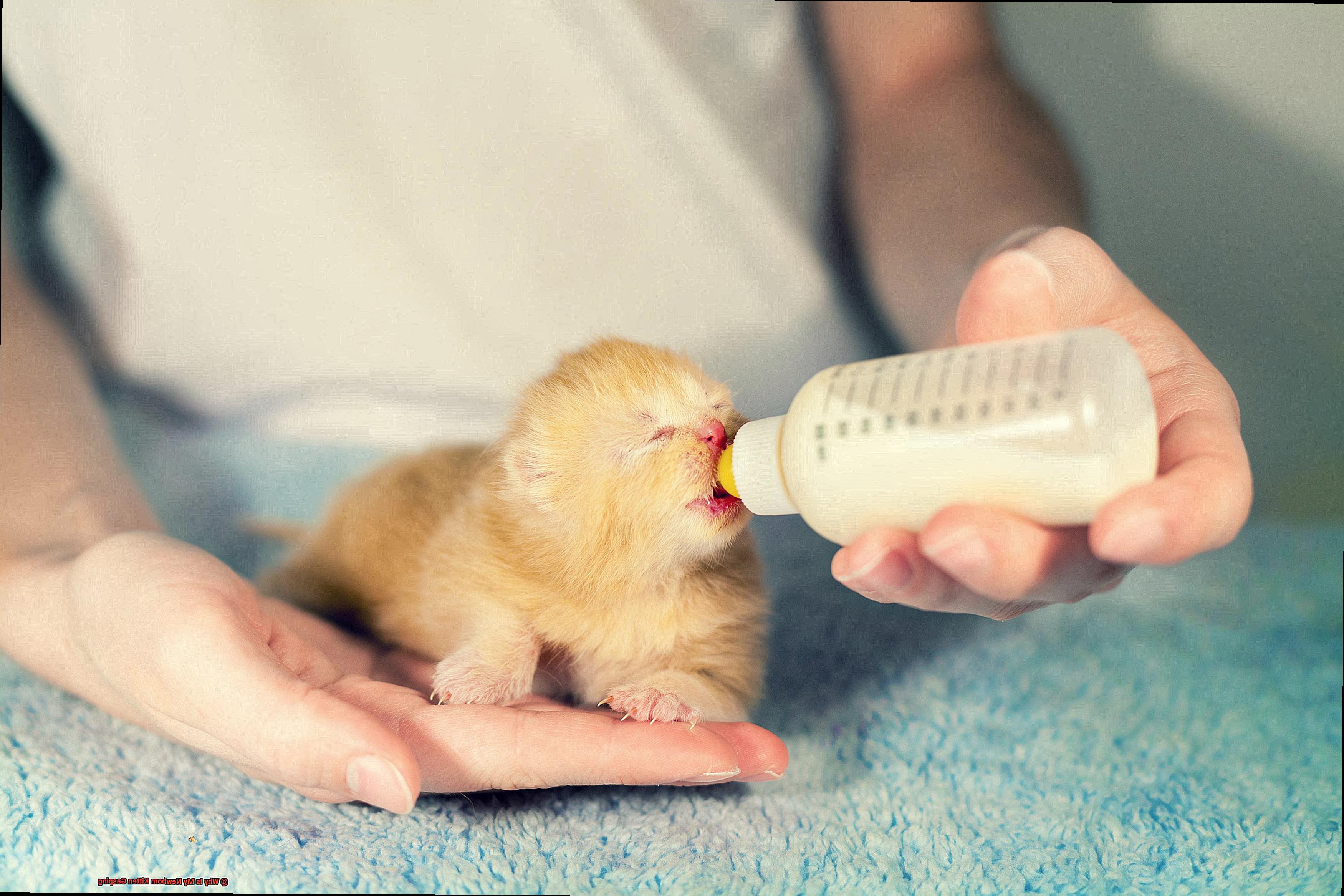
But if the pauses become frequent or last longer than 10 seconds, it could indicate an underlying medical condition and should be addressed immediately by a veterinarian.
It’s also important to note that kittens may make noises while they are breathing.
This is normal—nothing to worry about—but if the noise becomes louder or more frequent, it could mean there is an obstruction in the airway or another medical issue, and your kitten needs to see a vet right away.
Common Causes Of Gasping In Newborn Kittens
As pet owners, hearing newborn kittens gasp can be a cause for worry. Knowing the common causes of gasping is essential to providing the right treatment for your furry friend.
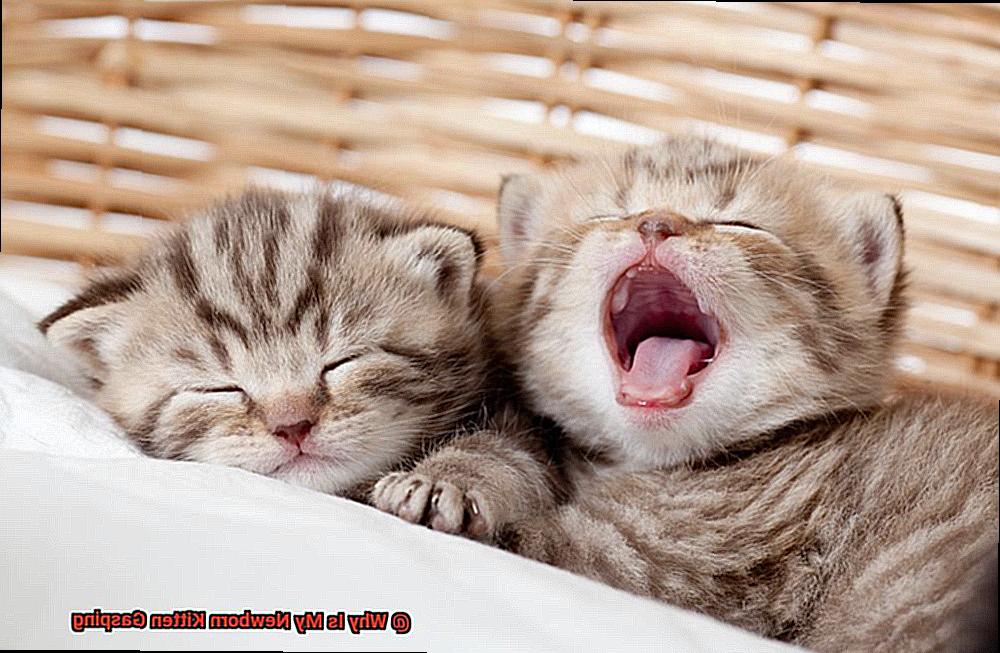
Respiratory infections are one of the most common causes of newborn kittens’ gasping. These infections can be caused by a wide range of viruses and bacteria that cause inflammation in the kitten’s lungs, resulting in difficulty breathing, coughing, or wheezing.
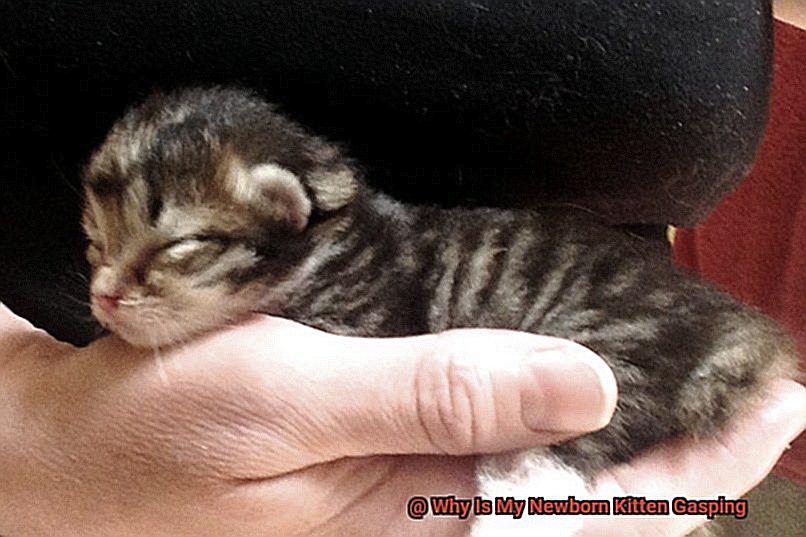
Congenital heart defects may also lead to a kitten having trouble breathing or even gasping for air.
This occurs when the heart’s geometry prevents it from pumping blood properly, leading to labored breathing, cyanosis, and exercise intolerance as symptoms.
Aspiration is another frequent cause of newborn kittens’ gasps. When a kitten inhales food, water, or other foreign objects into their lungs, it can lead to respiratory difficulties and gasping for air.
Pneumonia, bronchiolitis, and tracheal collapse are other potential causes of gasping in newborn kittens.
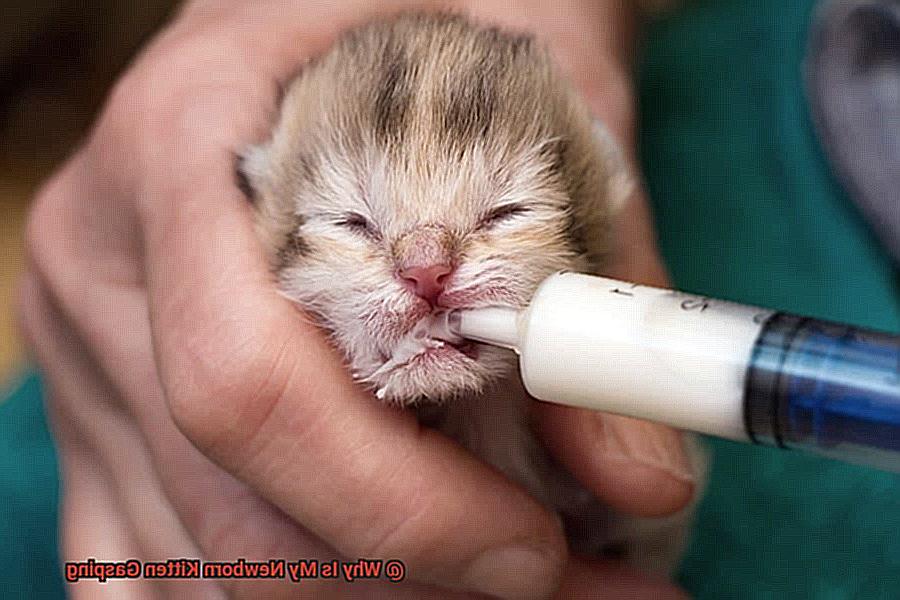
All three disorders require urgent medical attention, as they can be life-threatening if not treated quickly and correctly.
By being aware of these common causes of gasping in newborn kittens, pet owners are better equipped to provide their furry friends with the best care possible.
How To Tell If Your Kitten Is Gasping For Air
Signs of Gasping for Air
Gasping for air is a sign of respiratory distress in cats. Symptoms include open-mouth breathing, labored breathing, wheezing, and rapid breathing.
Your cat may also be panting, coughing, or having difficulty inhaling. If your cat is gasping for air, it is important to seek veterinary care immediately.
Causes of Gasping for Air
Gasping for air can be caused by a variety of conditions, including asthma, allergies, heart disease, and infections.
It can also be caused by foreign objects lodged in the throat or lungs or by trauma to the chest or abdomen. It is important to identify the underlying cause to provide appropriate treatment.
Diagnosis of Gasping for Air
Your veterinarian will perform a physical examination and may recommend diagnostic tests such as chest X-rays or blood work to help diagnose the cause of your cat’s gasping for air.
Depending on the results of these tests, additional tests may be recommended to help determine the cause of the problem.
Treatment of Gasping for Air
Treatment for gasping for air depends on the underlying cause. In some cases, oxygen therapy may be needed to help your cat breathe more easily.
Medications such as bronchodilators and anti-inflammatories may also be prescribed to reduce inflammation and improve breathing. In severe cases, surgery may be necessary to remove an obstruction or repair a damaged organ.
Prevention of Gasping for Air
The best way to prevent gasping for air is to keep your cat healthy, up-to-date on vaccinations, and to schedule regular check-ups with your veterinarian.
It is also important to keep your cat away from smoke and other irritants that can trigger respiratory problems.
Additionally, keeping your cat indoors and away from other cats can help prevent the spread of infections that can cause respiratory distress.
What To Do When You Notice Your Kitten Gasping For Air
When your beloved kitten is gasping for air, it is essential to act quickly and seek medical attention.
Taking them to the vet right away and informing them of the situation can help assess the situation and provide a diagnosis or treatment plan.
It is important to monitor your kitten’s breathing rate and check their gums for any signs of pale or blue coloring.
If necessary, oxygen therapy, antibiotics, or other treatments may be prescribed to help your kitten breathe more easily.
Seeking Medical Attention
If you notice your kitten gasping for air, it is critical to seek medical attention as soon as possible.
Take your kitten to the vet and let them know what you have noticed. The vet will be able to assess the situation and provide a diagnosis or treatment plan that is best suited for your kitten’s needs.
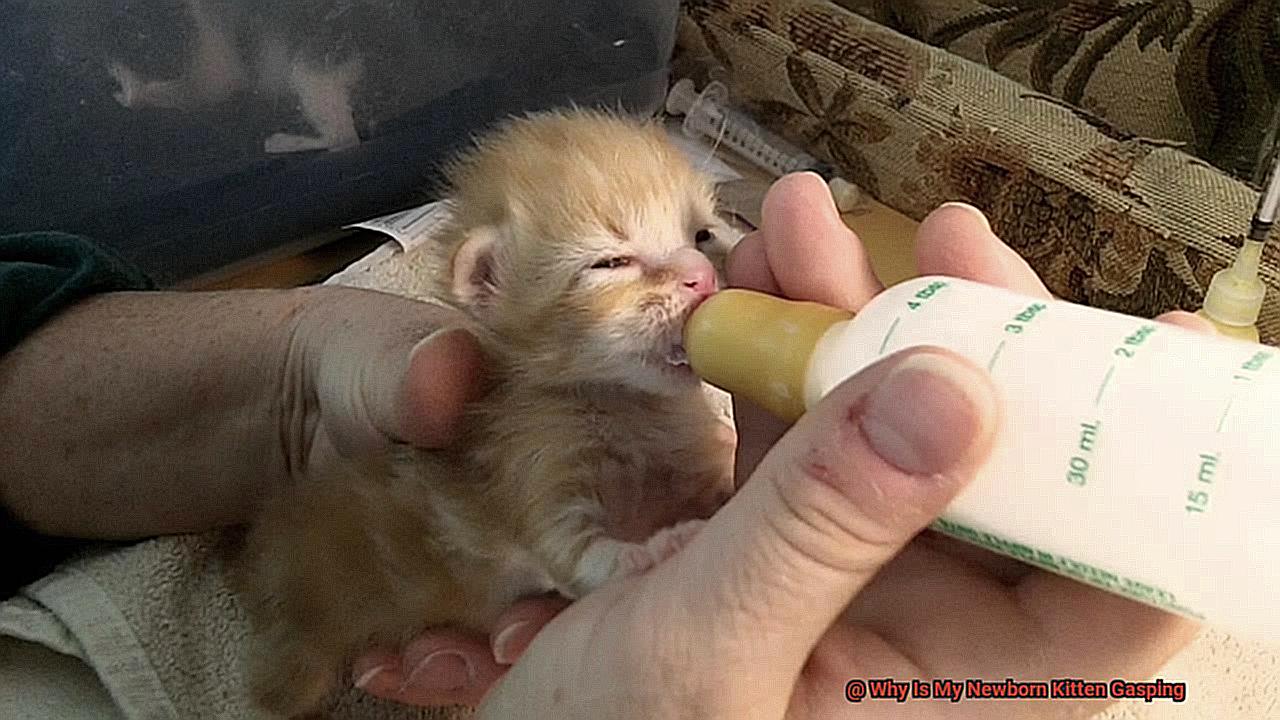
It is important to monitor their breathing rate and make sure they are not having difficulty breathing.
Checking their gums can also help determine if there is a lack of oxygen by looking for signs of pale or blue coloring.
Newborn Kittens Gasping For Air
If you notice your newborn kitten gasping for air, it is essential to take immediate action. First, check their airways and make sure no obstructions are blocking their ability to breathe normally.
If they are having difficulty breathing, you may need to clear their airway using a suction bulb or by gently rubbing the chest until they can breathe normally again.
It is also important that they have access to fresh air and a comfortable temperature that allows them to rest comfortably throughout the day without becoming too hot or cold.
Treatment Options
Depending on what triggered your kitten’s gasping episode, there are several treatments available that can help restore normal breathing patterns quickly and easily.
Oxygen therapy may be prescribed if necessary to help them breathe more easily, while antibiotics may be prescribed if an infection is present that could be causing the issue.
It is also important that you monitor their diet closely to ensure they are getting enough nutrients, which can improve overall health and reduce the risk of respiratory issues in the future.
Monitoring Breathing Rate and Oxygen Levels
Monitoring your kitten’s breathing rate after noticing they were gasping for air will help ensure they do not have any further difficulties with their breathing patterns in the future.
Checking their gums daily can also help detect signs of pale or blue coloring, which could indicate a lack of oxygen in their system and require immediate attention from a doctor if seen.
How To Clear Your Kitten’s Airways
It can be heartbreaking to see your beloved kitten struggling to breathe. If your kitten is having difficulty with their airways, it is essential to try and open them up as soon as possible. Below, we have outlined a few suggestions on how to do this safely and effectively.
Using a Bulb Syringe
The most common way of clearing your kitten’s airways is by using a bulb syringe. This device will gently suction out any mucus or fluid that may be blocking the airways in their nose and throat.
To use the syringe, simply insert the tip into the nostrils or throat and squeeze the bulb until you hear a “stench” sound. Be sure not to apply too much pressure, as this could cause further distress or injury to the kitten.
Investigating Foreign Objects
If your kitten is already having trouble breathing, it’s important to look for any foreign objects that might be blocking their airways.
These could include pieces of food or string, so make sure you check their nose and throat area for any obstructions. If you find an object that is blocking their airway, carefully remove it with tweezers or a pair of forceps.
Respiratory Infections and Allergies
Kittens can become congested due to a variety of causes, including respiratory infections, allergies, and even some types of parasites.
If you suspect that your kitten has a respiratory infection or an allergy-related congestion issue, then it is vital to get them checked out by a veterinarian as soon as possible.
Warm Steam Therapy
Warm steam therapy is another way to help clear your kitten’s airway. To do this, place a bowl of hot water near your kitten and let it inhale the steam for 10–15 minutes at a time. This will help loosen up any mucus in their lungs and make it easier for them to breathe again.
Over-the-Counter Medications
If all else fails and you are still having trouble clearing your kitten’s airways, then you may want to consider using an over-the-counter decongestant or respiratory drug prescribed by your veterinarian.
These medications are specifically designed for cats and can help reduce inflammation in their lungs while also assisting them in removing any excess mucus buildup in their airways.
Whatever method you choose for clearing your kitten’s airways, remember that prevention is better than cure.
Regularly checking on them and offering preventative services such as regular vaccinations can go a long way toward keeping them healthy and happy.
How To Treat Fluid In The Lungs Of Newborn Kittens
Causes of Fluid in the Lungs of Newborn Kittens
Fluid in the lungs of newborn kittens can be caused by various factors, such as infection, trauma, or congenital defects. It is important to identify the cause before attempting to treat the condition.
Diagnosis of Fluid in the Lungs of Newborn Kittens
The diagnosis of fluid in the lungs of newborn kittens is typically done with a physical examination and imaging tests such as X-rays or ultrasounds. Blood tests may also be used to determine if an infection is present.
Treatment Options for Fluid in the Lungs of Newborn Kittens
Treatment options for fluid in the lungs of newborn kittens may include antibiotics, diuretics, or oxygen therapy.
Surgery may also be necessary to remove any fluid or blockages that are present.
Home Remedies for Fluid in the Lungs of Newborn Kittens
Home remedies for fluid in the lungs of newborn kittens may include humidifiers, steam inhalation, and warm compresses.
It is important to keep the kitten hydrated and provide plenty of fluids to help clear the lungs.
Prevention of Fluid in the Lungs of Newborn Kittens
Prevention of fluid in the lungs of newborn kittens can be achieved by providing proper nutrition and hygiene, avoiding contact with sick animals, and vaccinating kittens against common diseases.
It is also important to monitor for any signs or symptoms that could indicate a problem.
When To Seek Veterinary Help For Your Newborn Kitten
When it comes to newborn kittens, even the slightest sign of distress can be cause for concern.
If your kitten is gasping for air or having difficulty breathing, it’s essential to seek veterinary help immediately.
Open-mouth breathing Labored breathing and severe coughing are all telltale signs of distress in newborn kittens.
Due to their immature immune systems, kittens are especially vulnerable to respiratory infections and can quickly become dehydrated and suffer from electrolyte imbalances if not treated promptly.
If symptoms persist for more than 24 hours, it’s time to get your furry friend checked out by a professional.
Depending on the diagnosis, the vet may prescribe antibiotics if the kitten has a secondary infection such as pneumonia or bronchitis. In some cases, surgery may be necessary to remove an obstruction in the airway.
It’s important to remain vigilant when caring for a newborn kitten and seek veterinary help as soon as possible if any signs of distress arise. Early intervention can help prevent more serious health issues down the road.
Tips On Keeping Your Newborn Kitten Healthy And Safe
Bringing home a new kitten is a wonderful experience for any family, but it’s also crucial to make sure your new furry friend is healthy and safe. To help you keep your newborn kitten safe and healthy, here are nine tips to follow.
- Make sure your kitten is eating and drinking enough. Kittens should be eating at least four times a day and consuming plenty of fluids. Monitor their hydration levels by providing fresh food and water at all times.
- Keep your kitten’s environment clean and safe. Remove any potential hazards, such as sharp objects or toxins, from the area and ensure the temperature in your home is comfortable for them.
- Take your kitten to the vet for regular checkups and vaccinations. This will help ensure they stay healthy and free from any diseases or illnesses that could cause gasping problems.
- Monitor your kitten’s breathing closely, especially when they are sleeping or playing. If you notice any changes in their breathing, contact a vet immediately for advice on how to help them.
- Provide plenty of toys and activities for your kitten to keep them stimulated and entertained, as boredom can lead to gasping problems in kittens too!
- Make sure to have a warm bed with plenty of soft blankets and toys for them to enjoy in their new home.
- Keep an eye on the litter box, making sure it is kept clean at all times to prevent any infections or illnesses from developing in your kitten’s system due to uncleanliness or bacteria build-up in the litter box itself.
- Spend time playing with your kitten every day, as this will help them stay healthy and active.
- Lastly, make sure that you keep your kitten away from any harmful objects or substances, such as chemicals and detergents.
Also Read: At What Age Are Kittens Safe From Tomcat?
Conclusion
If your newborn kitten is gasping, it could be due to some issues. It’s important to keep an eye on the kitten and take them to the vet if they don’t seem to be improving.
With proper care and attention, you can ensure that your precious bundle of fluff stays happy and healthy.

